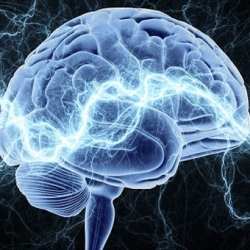
The exact genetic roots of autism are still being untangled, but we do know that the most common single-gene causes of the condition is Fragile X syndrome, in which errors on the X chromosome trip up normal neural development.
Specifically, Fragile X syndrome prevents the production of a crucial protein known as FMRP. This particular protein is needed to activate the NOS1 gene, which in humans is found throughout the developing brain. Most importantly, NOS1 helps guide the maturation of the brain’s speech and language and decision-making centers.
Although we don’t actually know for absolutely certain, it seems likely that there’s a connection between the loss of NOS1 activity in these parts of the brain and a lot of the cognitive impairments seen in Fragile X syndrome. These include speech difficulties, reduced intelligence scores, and attention problems. Of course, there’s substantial overlap between the effects of Fragile X syndrome and autism symptoms.
Indeed, Fragile X syndrome accounts for about 5% of autism cases, and those with the syndrome have anywhere from a 15% to 60% chance of also having autism spectrum disorder. Obviously, there’s a lot of uncertainty with the numbers there, but there’s still enough verifiable data there for researchers to consider Fragile X syndrome the most common single-gene cause of autism that we currently know about.
And now, researchers at Yale’s Kavli Institute for Neuroscience have discovered something intriguing about the NOS1 activity that is so linked to Fragile X syndrome. The specific genetic activities disrupted by the syndrome are only seen in the human brain – when the researchers looked for similar NOS1 activity in mouse brains, they couldn’t find anything.
This almost certainly means that NOS1 is linked to the higher brain functions that set humans apart from other species. It also suggests that, if the disruption of NOS1 activity is indeed a crucial factor in the cognitive problems seen in Fragile X and autism, then it’s the presence of those higher brain functions in the first place that makes us vulnerable.
